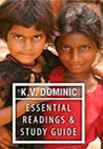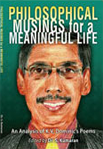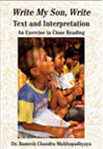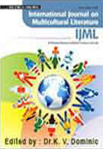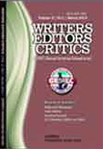Books Review in Detail
Review Of I.K. Sharma’s Review of K. V. Dominic’s Winged Reason
I.k. Sharma’s review of winged reason
A BIG BUNNY IN THE FIELD
K. V. Dominic. Winged Reason.
New Delhi: Authorspress, 2010. Rs. 95/- pp. 77.
ISBN 978-81-7273-530-2
_____________________________
Book Review by I. K. Sharma
_____________________________
(Appeared in Poetcrit 24.2 (July 2011)
The title of the book threw me off. It made me think whether or not the two words had been forcibly yoked together. Doesn’t Reason decry Wings? It, I guess, prefers to walk steadily, step by step, to reach the state of Wisdom. It’s never in a hurry. On the other hand, Wings show no preference to slow pace or to the shuffling along the street. Then? All this led me to think of the well- known intellectuals and writers of the poet’s state. For instance, Adi Shankaracharya ‘who consolidated the doctrine of Advaita Vedanta’ (Reason) and Kamala Das (Wings). Didn’t Kamala Das grow wings at an incredible speed? Unconsciously the poet absorbed the spirit of both and together they helped him compose the title.
It is the first collection of poems of a big bunny, for sure. He begins when many writers plan to bid farewell to the Muse. For instance William Shakespeare. His swan song–The Tempest–appeared in his forty- eighth year. And Dominic (born 1956) let forty-seven years go by and launched his poetic career the following year. He let the four decades of the twentieth century pass sedately. Not a trace of it, he thought, be seen anywhere in his poetic career. What then has he been doing all along? Cultivating his own garden. Later, editing an international journal (founded in the new century), and reading and promoting the literature growing at ‘our’ feet or in ‘our’ backyard. Poetry therefore patiently waited in a side room.
But a late start is not always a bad start. The writer stands to gain in another respect. All romantic fumes of mind and frothiness of language wither away by then. Endowed thus with a new insight he looks critically at his own self, re-views his ideals, and takes a stand against many questionable actions that largely affect humankind.
Viewed from this angle Winged Reason is a mix of tributes and questions–tributes he pays to George Joson, a colleague (p.17), to E. K. Nayanar, man of the masses (19), to Kaumudi, the Hindi teacher (74), to Michael Jackson, King of Kings (77), to Vrinda, the one-legged dancer (57), to Helen, the visually challenged bright girl (38), to Labour that makes our life worth living (45), to Onam, the great national festival of Kerala, (53),and above all to OM, ‘the holiest mantra of mantras’ (66), and questions he puts to every thinking person. So first to himself:
Hey Mister, have you no shame
to eat the flesh of
innocent animals and fish? (76)
Out of a sense of remorse, the born Christian blasts himself and sculpts a new Dominic–a vegetarian by choice. (Another example is of Navjot Singh Sidhu, cricketer-turned-politician, an incorrigible meat eater, who gave up meat eating for good. Many more are in the line.) In a way the poet unveils his heart at a marketplace for the people to view it. Not satisfied only with his personal statement, he castigates man in general through the voice of animals that have no voice in the general scheme of humankind. Says a sheep:
Hark, you Man to my wail . . . . . . the milk for my lamb you suck and drain and grow fat and cruel . . . . . when they became old you cut their heads and ate their flesh. (p.24)
In another poem he again denounces Man:
thousands of fiends
inhabit this planet,
turning the earth
into a big slaughter house. (65)
Many more inconvenient questions lie ahead. He questions the morals of money-mad young generation that moves out of the country in search of green pasture and leaves their old parents behind to suffer in loneliness. In other poems too his anti-elitist stance is obvious. Also, he questions the way Indian democracy had been working all these years. To drive the point home about the shenanigans of the high and mighty, he half-mockingly says:
Criminal MPs
brought from jails
to prove majority on floor; (60).
In most poems the poet is in and around his state. Through portraits of known and not so well known characters he attempts to showcase his contemporary Kerala. Certainly, it is significant that he has not lost touch with his local roots. The minor incidents of his own life he takes up for narration reveal the gentle side of the poet. Also, they indirectly rebuff those who in the name of their own God resort to ungodly acts. On this account, his poems have an air of authenticity. Globalization may have touched certain parts of his state but his heart is where it should be. Only once his Muse left his state and the shores of India to see the war- ravaged Iraq and the redness of her rage scripted a memorable text:
I wish I had the claws of a vulture
to fetch the skeletons from Iraq
and build a bone-palace
to imprison Bush in it. (21)
Irrepressible high voltage emotion found equally dark and powerful imagery to convey the wrath. Fine! Deserves full marks.
At times his expressions in poems have come out very well. But that alone should not be enough. Free verse doesn’t mean loose verse. It should be made tight. All verbiage be summarily discarded. Also, what passes easily in the mother-tongue does not go well in the language we have willingly adopted for our creative use. (Here I would like to ask every teacher of English to read the article ‘On Reviewers and Reviewing’ published in The Journal of Indian Writing in English, vol. 39, January 2011, written by a senior professor.) Do we, friendly reviewers, not spoil our poets by pampering them, by not pointing out the fault lines in the rock? This one way approach is surely harmful. A poet who wishes to go ahead should approach the critical eye before going to the press and not the benign eyes of a bosom friend. That will be good for the health of the poet and the literature we are trying to promote in the country. I think, both pat and slap (light) are necessary to keep the poet on the right track.
Let me show a few glaring examples of slips:
Do we ‘view’ the cry, or hear it? (p.22)
Is ‘fed up’ appropriate in the context? (54)
Why was the tense changed–from past to present after 22 lines in the poem “Anand’Lot”?
I have often come across the wrong use of ‘Anthology’ (16). In Collins Cobuild English Language Dictionary it is clearly defined as ‘a collection of poems, plays, stories, songs, etc, by different writers, which are published together in one book’.
The poet, I think, was in a hurry to bring out his book. Swayed by the opinions of friends who are not in the field, he let go every half-boiled poem into the book. Further, the poet in his preface writes that he gives ‘priority to the CONTENT of a poem than to its style.’ Agreed. And I do not wish to deprive the poet of his inalienable right. But, sir, where is CONTENTS of the book? The primary requirement of a publication. For this lapse who will take the blame–the poet or the publisher? Both left it to the resourcefulness of the reader!
I hope the poet will let Reason precede the Wings when he plans the next collection.
Prof. I. K. Sharma (Renowned English Poet, Critic), Jaipur, Rajasthan, India.

